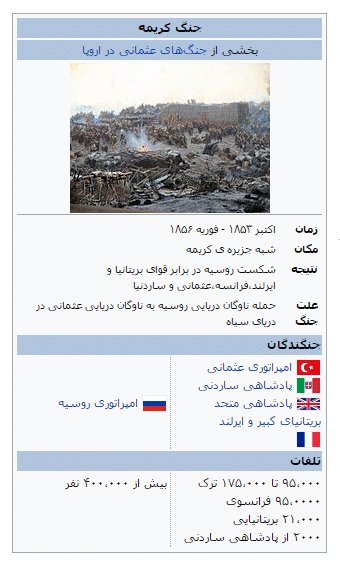جنگ کِریمه به نبردهای اکتبر ۱۸۵۳ تا فوریه ۱۸۵۶ گفته میشود که میان امپراتوری روسیه تزاری از یک سو و امپراتوری دوم فرانسه، امپراتوری بریتانیا، پادشاهی ساردنی و امپراتوری عثمانی از سوی دیگر در شبه جزیره کریمه رخ داد.
جنگ کریمه به دلیل به کارگیری سلاحهای جدید و فنون جنگی نوین نخستین جنگ مدرن قرن نوزدهم محسوب میشد و موجب کشتار فراوانی گردید.
تاریخدانان تا کنون علل مختلفی را برای بروز این جنگ خونین برشمرده اند اما جالب است بدانید در زبان ترکی شما می توانید تمام این علل را در یک کلمه خلاصه کرده و بگویید:
“sevistirilemediklerinden”
معنی همین یه کلمه می شه “چون قادر نبودند که یکدیگر را متقابلا دوست بدارند!”?
Crimean War
Military Conflict
The Crimean War was a military conflict fought from October 1853 to March 1856 in which the Russian Empire lost to an alliance of France, Britain, the Ottoman Empire, and Sardinia.
Dates: Oct 5, 1853 – Mar 30, 1856
Result: Allied victory; Treaty of Paris


چرت
در زبان پسوندی نمیتوان کلمات را به هم چسباند تنها کلمه + پسوند درست است خودات نگاه کن چند تا کلمه را به هم چسباندی
چیزی هم که بالا نوشته شده در ترکی جمله کامل است نه کلمه
سلام زبان
از کتاب زبانشناسی بیان گردید.
What about “Sevistirilemediklerinden”? This is a Turkish word. In Turkish you can make up words just about as long as you like, and be understood, whether or not they happen to have been spoken before. There was a German scholar, Max Müller, who remarked that the cause of the Crimean War could be expressed in this single (though medium-long) Turkish word: it means “Because of their not having been able to be made mutually to love one another”. Max Müller meant by this to illustrate the delightful nature of the Turkish language, which is what is called “agglutinating”: the root sev- means “love” and all the rest of the syllables are meaningful elements that in English would be separate words—for instance the syllable -me- carries the negative meaning, and -ler- the plural meaning. Also, Turkish has a famous feature called “vowel harmony”. Because the vowel in the first syllable is e, the vowels in the rest of the syllables are bright, fluting i’s and e’s; if the first syllable had had an a or an o, the other syllables would have had dark vowels such as a, o, u…